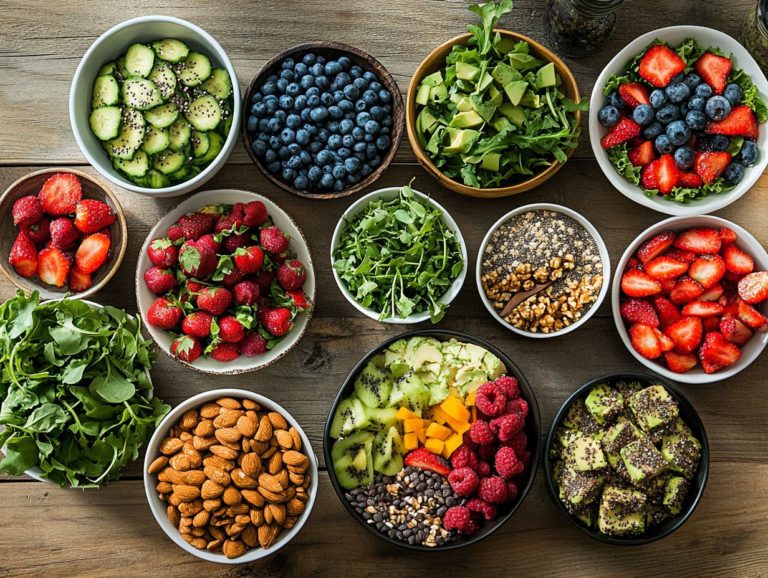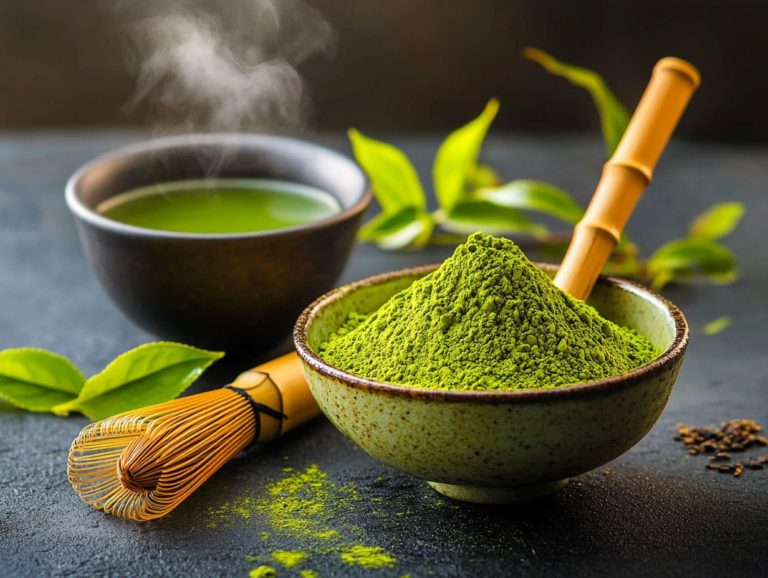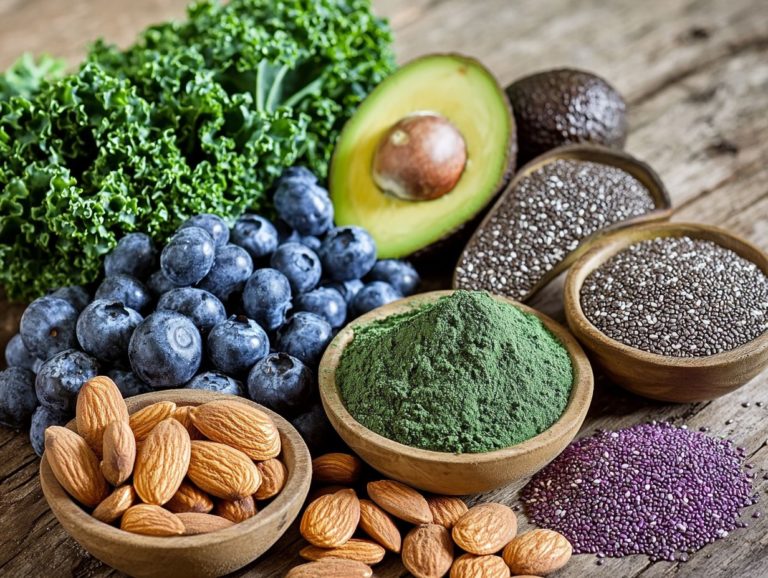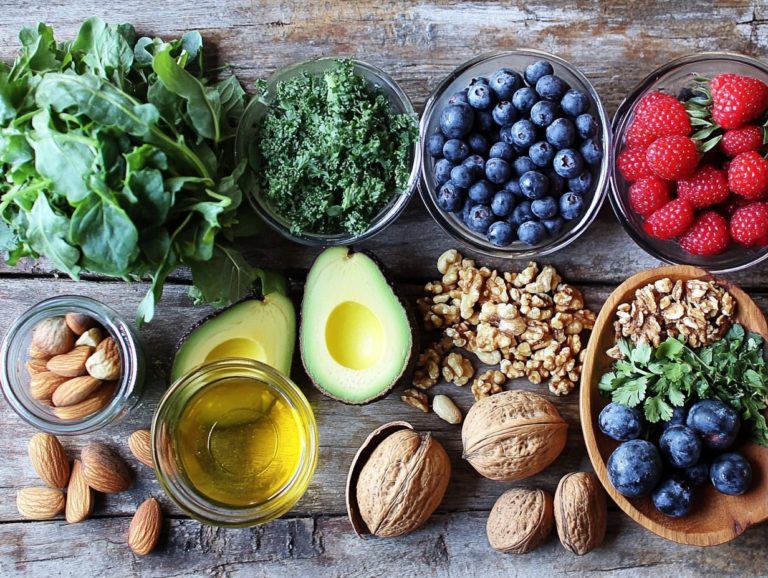The Top Superfoods for a Plant-Based Diet
Incorporating superfoods into your diet can truly transform your health, particularly when you embrace a plant-based lifestyle.
From vibrant leafy greens to luscious berries, these nutrient-rich foods bring a plethora of benefits, boosting your energy, enhancing your immunity, and promoting overall well-being.
This article will guide you through the top superfoods that elevate your meals while providing essential nutrients. This article also addresses common misconceptions about plant-based diets and offers practical tips for maintaining balance.
Are you ready to supercharge your plate? Get ready to embark on a delicious journey that will transform your meals!
Contents
- Key Takeaways:
- 1. Leafy Greens: The Ultimate Superfood
- 2. Berries: Antioxidant Powerhouses
- 3. Avocados: Healthy Fats and Nutrients
- 4. Legumes: Protein and Fiber-Rich Alternatives
- 5. Nuts and Seeds: Nutrient-Dense Snacks
- 6. Whole Grains: Complex Carbohydrates for Sustained Energy
- 7. Cruciferous Vegetables: Cancer-Fighting Properties
- 8. Fermented Foods: Gut-Healthy Probiotics
- 9. Coconut: Versatile and Nutrient-Dense
- 10. Mushrooms: Immune-Boosting and Anti-Inflammatory
- 11. Seaweed: Nutrient-Rich Sea Vegetable
- 12. Citrus Fruits: Vitamin C and Antioxidants
- 13. Garlic and Onions: Immune-Boosting and Anti-Inflammatory Properties
- 14. Tomatoes: Rich in Lycopene and Vitamin C
- 15. Dark Chocolate: Antioxidant-Rich Indulgence
- How Can a Plant-Based Diet Benefit Your Health?
- Frequently Asked Questions
- What Are the Top Superfoods for a Plant-Based Diet?
- Why Are These Superfoods Considered the Best for a Plant-Based Diet?
- How Can I Incorporate These Superfoods Into My Plant-Based Meals?
- Are These Superfoods Easily Accessible and Affordable?
- Can These Superfoods Help With Weight Loss on a Plant-Based Diet?
- Are There Any Potential Drawbacks to Incorporating These Superfoods Into a Plant-Based Diet?
Key Takeaways:
- Leafy greens are the ultimate superfood, offering a wide range of vitamins, minerals, and antioxidants for optimum health and vitality.
- Berries are packed with antioxidants, making them a powerful tool for fighting inflammation and promoting overall wellness in a plant-based diet.
- Avocados are a versatile and nutrient-dense source of healthy fats and essential nutrients, making them a must-have for a well-rounded plant-based diet.
1. Leafy Greens: The Ultimate Superfood
Leafy greens are the cornerstone of a plant-based diet and truly deserve their reputation as the ultimate superfood.
Packed with essential vitamins and minerals, they significantly contribute to your overall health and wellness.
These vibrant vegetables, from kale to spinach, are not only low in calories but also high in dietary fiber, making them essential for maintaining digestive health and managing weight.
Antioxidants in leafy greens help fight oxidative damage. They support a strong immune system and provide anti-inflammatory benefits.
Among these exceptional greens, kale shines with its abundant vitamins A, C, and K, promoting eye health and enhancing bone strength.
Spinach, on the other hand, is loaded with iron and magnesium, making it a valuable ally for elevating your energy levels and supporting muscle function.
Swiss chard brings a unique blend of vitamins A and K, along with vital minerals like potassium, which are crucial for heart health.
By incorporating these leafy greens into your vegan lifestyle, you can enjoy a diverse range of nutrients that not only bolster your physical health but also enhance your mental clarity and overall vitality, creating a harmonious balance in your everyday life.
2. Berries: Antioxidant Powerhouses
Berries, such as acai, goji, and blueberries, are revered for their status as antioxidant powerhouses, celebrated for the incredible health benefits that arise from their abundant natural compounds found in plants and vitamin C.
These vibrant fruits are brimming with a variety of antioxidants, including anthocyanins and flavonoids, which are essential for neutralizing free radicals and shielding your body from oxidative stress. This protective action is crucial in preventing cellular damage that can lead to chronic illnesses, like heart disease and cancer.
The impressive range of vitamins and minerals found in berries significantly enhances a plant-based diet, elevating your overall nutritional intake.
Their remarkable ability to strengthen the immune system is something you shouldn’t overlook; regularly enjoying these nutrient-dense berries can bolster your body’s defenses, promoting a robust and flourishing state of health.
3. Avocados: Healthy Fats and Nutrients
Avocados, often celebrated as nutrient-dense superfoods, are rich in healthy monounsaturated fats and essential nutrients, including omega-3 fatty acids, which are crucial for promoting heart health and overall wellness.
By incorporating these creamy fruits into your diet, you can significantly enhance your nutrient intake.
They are brimming with vitamins such as E, K, and C, along with potassium and fiber.
The healthy fats in avocados not only aid in nutrient absorption but also provide a satisfying effect, making them an excellent choice for anyone embracing a vegan lifestyle.
Their versatility truly shines in a variety of recipes, from smoothies and salads to spreads and desserts.
Whether you enjoy them smashed on toast, blended into a silky soup, or simply as a quick snack, avocados can effortlessly elevate your culinary creations while contributing to a balanced, health-conscious diet.
Start adding these superfoods to your meals today and feel the difference in your health!
4. Legumes: Protein and Fiber-Rich Alternatives
Legumes, like lentils and black beans, are healthy foods rich in protein and fiber. They offer a wealth of health benefits that boost your overall wellness.
These nutritious options include chickpeas, peas, and kidney beans, each providing an impressive protein punch ranging from 15 to 25 grams per cooked cup. They are also fantastic sources of essential vitamins and minerals, including iron, potassium, and folate, vital for maintaining your body s health.
Incorporating legumes into your meals enhances your protein intake and significantly elevates your dietary fiber levels. This fiber boost is beneficial for digestive health, promoting regular bowel movements and nurturing good gut bacteria, ultimately leading to a more vibrant you.
5. Nuts and Seeds: Nutrient-Dense Snacks
Nuts and seeds, like flaxseeds and hemp seeds, celebrate nutrient density. They provide a treasure trove of healthy fats, proteins, and essential vitamins, making them an ideal choice for nutritious snacking.
By incorporating a variety of these superfoods into your meals, you enhance flavor and boost your overall health. For example, almonds deliver a hearty dose of vitamin E for skin vitality, while chia seeds are brimming with omega-3 fatty acids that promote heart health.
A handful of walnuts can elevate your salad, and sunflower seeds can add a delightful touch to your morning smoothie bowl. Use them as a crunchy topping on yogurt or blend nut butters into sauces; these versatile ingredients seamlessly integrate into various recipes, ensuring your vegan diet is balanced and bursting with flavor.
6. Whole Grains: Complex Carbohydrates for Sustained Energy
Whole grains, such as quinoa and brown rice, are essential sources of complex carbohydrates that provide sustained energy. They serve as a cornerstone of any healthy plant-based diet, enhancing your overall health through their impressive fiber content.
These foods support digestive health by promoting regular bowel movements and maintaining a balanced gut microbiome. Their fiber is invaluable in preventing constipation and lowering the risk of digestive disorders.
Whole grains also stabilize blood sugar levels, ensuring consistent energy throughout the day and helping you avoid those annoying midday slumps.
Choosing whole grains over refined grains improves satiety and nutritional density, leading to better overall well-being and healthier eating habits. Don’t miss out on these benefits!
7. Cruciferous Vegetables: Cancer-Fighting Properties
Cruciferous vegetables, like broccoli and kale, are celebrated for their remarkable cancer-fighting properties. This reputation stems from their rich concentrations of antioxidants and phytonutrients, essential for maintaining robust health.
These exceptional plants include Brussels sprouts and cauliflower, offering unique compounds such as sulforaphane and indole-3-carbinol. For instance, sulforaphane helps detoxify the body and may protect against certain types of cancer by neutralizing harmful substances.
These vegetables also support digestive health by nurturing a healthy gut microbiome, increasingly acknowledged for its significance in overall wellness.
Incorporating these nutrient-dense options into your meals not only elevates flavor but also arms you with a powerful defense against diseases.
8. Fermented Foods: Gut-Healthy Probiotics
Fermented foods like sauerkraut and kimchi are essential for promoting gut health. These culinary delights are brimming with probiotics that help maintain a balanced microbiome.
Ultimately, these probiotics enhance your overall wellness. These natural powerhouses are filled with beneficial bacteria that aid in digestion and strengthen the immune system.
They can even elevate your mood. If you’re embracing a vegan lifestyle, incorporating these probiotic-rich options is both simple and delicious.
Think about stirring a spoonful of miso paste into your soup for a burst of flavor and health! Savor a tangy coconut yogurt or sprinkle nutritional yeast over your salads.
These small yet impactful additions can significantly enhance your digestive health. You can indulge in a varied and vibrant plant-based diet while reaping the maximum benefits of probiotics.
9. Coconut: Versatile and Nutrient-Dense
Coconut, in its many forms oil, milk, and meat is a versatile and nutrient-dense superfood. It enriches your plant-based diet with healthy fats and a wealth of health benefits.
This tropical marvel elevates the flavor profiles of countless dishes. It brings with it an impressive array of essential nutrients, including vitamins and minerals that contribute to your overall wellbeing.
From the creamy richness of coconut milk that enhances smoothies and soups to the delightful crunch of shredded coconut that can transform granola or baked goods, the culinary possibilities are truly endless.
Incorporating coconut oil into your cooking can provide sustained energy. Its distinctive composition may aid digestion and promote heart health.
If you’re pursuing a balanced vegan lifestyle, use coconut in your meals. It’s both enjoyable and packed with nutrients!
10. Mushrooms: Immune-Boosting and Anti-Inflammatory
Mushrooms, often underestimated, are true superfoods. They offer remarkable immune-boosting and anti-inflammatory properties, making them a valuable addition to your health-conscious diet.
These intriguing fungi come in a range of varieties. Each presents unique health benefits and cooking flexibility.
For instance, reishi mushrooms are renowned for their stress-relieving effects. Shiitake mushrooms are celebrated for their ability to lower cholesterol and support heart health.
Oyster mushrooms not only enhance the flavor of your dishes but also help reduce inflammation. They boast impressive antioxidant properties.
Culinary enthusiasts appreciate how mushrooms can elevate flavors in soups, stir-fries, or as a protein alternative in vegetarian meals. By incorporating these tasty, nutrient-packed additions into your meals, you can significantly contribute to your overall wellness.
11. Seaweed: Nutrient-Rich Sea Vegetable
Seaweed, a nutrient-rich sea vegetable, stands out as one of the top superfoods. It s celebrated for its impressive levels of omega-3 fatty acids and essential minerals that support overall health.
This versatile ingredient comes in various types. Each brings unique flavors and health benefits that can elevate your diet.
For instance, nori, often found in sushi, is loaded with vitamin B12 a vital nutrient for anyone following a vegan lifestyle. Wakame serves as an excellent source of calcium and iron.
Incorporating these greens into your daily meals is effortless. Toss them into soups, sprinkle them over salads, or even blend them into smoothies for an extra nutritional kick.
By exploring the diverse world of seaweed, you can significantly enhance your meals. Enjoy the myriad benefits of a plant-based diet!
12. Citrus Fruits: Vitamin C and Antioxidants
Citrus fruits like oranges and lemons are rich in vitamin C and antioxidants. They are vital for your immune system and overall health.
These vibrant fruits also improve skin vitality, enhance digestion, and support heart health. Their compounds help prevent chronic diseases and assist with weight management.
There are many creative ways to add these zesty flavors to your meals. Try zesting citrus into salads or blending fresh juice into smoothies.
Using citrus segments in grain dishes adds flavor and nutrition. Enjoy these fruits to elevate both your health and meals!
13. Garlic and Onions: Immune-Boosting and Anti-Inflammatory Properties
Garlic and onions are helpful ingredients known for boosting immunity and fighting inflammation. They provide numerous health benefits, especially in a plant-based diet.
These aromatic foods are packed with vitamins, minerals, and antioxidants. For example, allicin in garlic is famous for fighting infections.
The compounds in onions also significantly reduce inflammation. Adding them to meals is easy!
Saut them in olive oil for soups and sauces, toss them into salads, or blend them into dips.
14. Tomatoes: Rich in Lycopene and Vitamin C
Tomatoes are a key ingredient in many diets, known for lycopene and vitamin C. These powerful antioxidants offer impressive health benefits.
This fruit enhances the flavor of many dishes while helping reduce risks of chronic illnesses like heart disease. They combat oxidative stress and protect your cells.
Tomatoes fit into a variety of plant-based recipes, from salads to stews, making them easy to include in your meals.
15. Dark Chocolate: Antioxidant-Rich Indulgence
Dark chocolate is a delicious treat that can offer health benefits. Enjoy it in moderation for a balanced vegan diet.
Rich in flavonoids, it may lower blood pressure and improve blood flow. Its anti-inflammatory properties can help reduce chronic disease risks.
To add this treat to your healthy lifestyle:
- Savor a square or two as a mid-afternoon snack.
- Blend it into your smoothie for a rich flavor.
- Pair it with fresh fruits for a tasty dessert.
By watching your portion sizes, you can enjoy dark chocolate without compromising your wellness.
How Can a Plant-Based Diet Benefit Your Health?
Embracing a plant-based diet can greatly enhance your health by providing essential nutrients, boosting your overall wellness, and lowering the risk of chronic diseases. This lifestyle focuses on foods high in vitamins and minerals like fruits and vegetables, making it a transformative choice.
This diet also boosts your immune system with its high antioxidant content. It promotes heart health by reducing blood pressure and cholesterol levels, which minimizes the chances of cardiovascular diseases. The emphasis on whole foods helps with weight management, allowing you to maintain a healthy body weight without the hassle of calorie counting.
Aligned with vegan principles, this diet encourages a compassionate approach to food, promoting sustainability while providing your body with essential vitamins and minerals.
Key Nutrients You Need for a Healthy Plant-Based Diet!
In a well-balanced plant-based diet, it’s crucial to focus on key nutrients like protein sources, vitamins, and minerals for optimal health.
Incorporating a diverse array of foods helps you meet these dietary needs. Essential proteins are abundant in legumes, quinoa, and nuts, providing building blocks for muscle repair and growth. Omega-3 fatty acids, important for heart and brain health, can be sourced from flaxseeds, chia seeds, and walnuts.
To avoid deficiencies, consider adding supplements or fortified foods to secure vitamins B12 and D. Colorful vegetables and whole grains can also boost your dietary fiber intake. Each of these nutrients plays a vital role in maintaining your health, especially within a plant-based lifestyle.
How to Easily Incorporate Superfoods into Your Diet?
Incorporating superfoods into your plant-based diet can be simple and enjoyable. This allows you to experience a wealth of health benefits while enjoying vibrant, nutritious meals.
One exciting aspect of using these nutrient-rich ingredients is the endless array of recipes and meal ideas available. Imagine blending leafy greens into a delicious smoothie, mixing in fresh berries and nuts for added texture and flavor. Transform your salads by adding various superfoods for visually stunning and nourishing dishes perfect for any season.
As you experiment with different cuisines, new culinary possibilities will unfold. Try a nourishing quinoa bowl topped with saut ed kale, roasted chickpeas, and a zesty berry dressing. This is where the true versatility and creativity of plant-based cooking comes to life.
Common Misconceptions About Plant-Based Diets
Despite the growing popularity of plant-based diets, common misconceptions can prevent you from fully embracing a vegan lifestyle, especially regarding nutritional deficiencies.
Many people mistakenly believe that a plant-based diet lacks sufficient protein, equating meat consumption with higher protein intake. This is simply untrue; many plant sources, like lentils, quinoa, and chickpeas, offer ample protein to support muscle health and overall bodily functions.
Concerns about missing essential nutrients like Vitamin B12 and Omega-3 fatty acids are also common. While it s true these nutrients are primarily found in animal products, fortified foods and supplements, along with a varied diet rich in dark leafy greens and flaxseeds, can easily fulfill your nutritional needs.
Ultimately, a well-planned plant-based diet can provide all the necessary nutrients while enhancing your health and well-being.
What Are Some Tips for Maintaining a Balanced Plant-Based Diet?
Maintaining a balanced plant-based diet takes careful meal planning. Focus on including a variety of legumes, whole grains, nuts, seeds, and an abundance of fruits and vegetables to craft vibrant and enticing meals. It s not just about swapping meat; it s about variety!
Plan your menus to incorporate diverse foods that provide a well-rounded intake of vitamins, minerals, and protein. Staying informed about key nutrients like vitamin B12, iron, and omega-3 fatty acids that may need extra attention is crucial for your long-term health.
For inspiration, consider using resources such as plant-based cookbooks, trusted food blogs, and meal planning apps. These can offer an array of recipes and ideas to keep your meals exciting and nutritious.
Frequently Asked Questions
What Are the Top Superfoods for a Plant-Based Diet?
The top superfoods for a plant-based diet include kale, avocado, berries, quinoa, nuts, and tofu.
Why Are These Superfoods Considered the Best for a Plant-Based Diet?
These superfoods pack a punch of essential nutrients, vitamins, and minerals that are important for a healthy plant-based diet.
How Can I Incorporate These Superfoods Into My Plant-Based Meals?
These superfoods can easily be added to salads, smoothies, stir-fries, and other plant-based dishes to boost their nutritional value and flavor.
Are These Superfoods Easily Accessible and Affordable?
Yes, most of these superfoods can be found in any grocery store or farmer’s market and are generally affordable for regular consumption.
Can These Superfoods Help With Weight Loss on a Plant-Based Diet?
Yes! These superfoods are low in calories and high in fiber, which can help with weight loss and maintaining a healthy weight on a plant-based diet.
Are There Any Potential Drawbacks to Incorporating These Superfoods Into a Plant-Based Diet?
Some superfoods, like nuts and avocado, are high in calories. Consume them in moderation to avoid weight gain. It s also important to vary your diet and not rely solely on these superfoods for all your nutritional needs.




